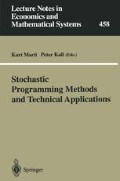Abstract
Particularly in view of the introduction of product liability, reliability-based design procedures, and for that matter optimization (RBO) receive increasing attention. The analysis deals with statistical uncertainties inherent in structural, material, damage parameters, etc., which are modeled by random variables. The mechanical representation of the structure and the component respectively is generally modeled by Finite Elements (FE). In this paper basic mathematical formulations of design objectives and restrictions including reliability measures are discussed. Based on these models structural reliability analyses provide information for design modification and selection of an optimal design solution. As generally minimization of the expected total cost of the structure including initial costs and costs due to failure, minimization of the overall probability of failure and weight minimization with respect to reliability constraints are considered. Design problems commonly denoted as multiobjective or multicriteria optimization problems are treated. For the reliability analysis numerical methods are utilized to estimate the reliability measures. These procedures are already cast in an easy-to-use-software, denoted as COSSAN (Computational Stochastic Structural Analysis). In this context a concept is discussed, which is based on the separation of the tasks of reliability analysis and nonlinear mathematical programming techniques for which pertinent applicable software is already available. The RBO procedure utilizes approximation techniques for estimating the reliability measures. In particular, the reliability analysis makes use of the well known Response Surface Method (RSM) in context with Advanced Monte Carlo Simulation techniques, while the reliability based optimization procedure itself is controlled by the well known NLPQL-algorithm. Finally a number of numerical applications are shown in order to exemplify the approach.
Access this chapter
Tax calculation will be finalised at checkout
Purchases are for personal use only
Preview
Unable to display preview. Download preview PDF.
References
Arora, J.S., Introduction to optimum design, McGraw-Hill, New York, 1989
COSSAN “Computational Stochastic Structural Analysis”, User’s Manual, Institute of Engineering Mechanics, Leopold-Franzens University, Innsbruck, Austria, 1996.
Freudenthal, A.M., Gaither, W.S., Probabilistic approach to economic design of maritime structures, Proceedings of 22nd International Navigation Congress, Permanent International Association of Navigation Congress, Sec. 11 /5, pp. 119–133 (1969)
Freudenthal, A.M., Safety and the probability of structural failure, Transactions ASCE, Vol. 121, pp. 1337–1397 (1956)
Gasser, M., Structural optimization based reliability criteria utilizing approximate methods, Dissertation, Leopold-Franzens University, Innsbruck, Austria, September 1996
Lind, N.C., Approximate analysis and economics of structures, Journal of the Structural Division, Vol. 102, No. ST6, pp. 1177–1196 (1976)
Marti, K., Stochastic optimization in structural design, ZAMM -Z. angew. Math. Mech., 72, 6, T452 - T464 (1992a)
Marti K., Semi-stochastic approximations by the response surface methodology (RSM)” Optimization, Vol. 25, pp. 209–230 (1992b)
Marti, K., Approximations and derivatives of probabilities in structural design” ZAMM -Z. angew. Math. Mech., 72, 6, T575 - T578 (1992c)
Nakib, R., Frangopol, D.M., RBSA and RBSA-OPT: Two computer programs for structural system reliability analysis and optimization” Computers & Structures, Vol. 36, No. 1, pp. 13–27 (1990)
Rubinstein, R.Y., Simulation and the Monte Carlo method, John Wiley & Sons, New York, 1981
Schittkowski, K., Theory, implementation, and test of a nonlinear programming algorithm Proceedings of Euromech-Colloquium 164 on “Optimization Methods in Structural Design”, Universität Siegen, 1982, Bibliographisches Institut, Mannheim, pp. 122–132 (1983a)
Schittkowski, K., On the convergence of a sequential quadratic programming method with an augmented Lagrangian line search function” Math. Operationsforschung, Ser. Optimization, Vol. 14, No. 2, pp. 197–216 (1983)
Author information
Authors and Affiliations
Editor information
Editors and Affiliations
Rights and permissions
Copyright information
© 1998 Springer-Verlag Berlin Heidelberg
About this paper
Cite this paper
Gasser, M., Schuëller, G.I. (1998). Some Basic Principles of Reliability-Based Optimization (RBO) of Structures and Mechanical Components. In: Marti, K., Kall, P. (eds) Stochastic Programming Methods and Technical Applications. Lecture Notes in Economics and Mathematical Systems, vol 458. Springer, Berlin, Heidelberg. https://doi.org/10.1007/978-3-642-45767-8_4
Download citation
DOI: https://doi.org/10.1007/978-3-642-45767-8_4
Publisher Name: Springer, Berlin, Heidelberg
Print ISBN: 978-3-540-63924-4
Online ISBN: 978-3-642-45767-8
eBook Packages: Springer Book Archive

